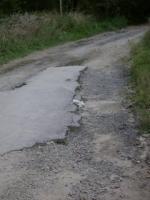 Last Thursday Community Bicycle Network supporters got together to discuss the future of the Network. CBN has been around since 1993 as a hub of various projects, ranging from working with youth on getting bike mechanics skills to bicycle recycling clubs to Bikeshare, a renowned bicycle lending program.
Last Thursday Community Bicycle Network supporters got together to discuss the future of the Network. CBN has been around since 1993 as a hub of various projects, ranging from working with youth on getting bike mechanics skills to bicycle recycling clubs to Bikeshare, a renowned bicycle lending program.
The feeling from the meeting was that there was renewed energy in a group of demoralized supporters. A lot of ideas were passed around that will then be put before the Annual General Meeting so the membership can decide the best actions. I had a few favorite ideas for what CBN is especially suited to take on - ideas I felt were strongly supported by the group at the gathering.
One is to explore more a model of (almost) self-sustainability through having income-generating projects that also support community access to affordable resources: cycling education, recycling, lending, and tool sharing. A focus on low-income groups would be done through this sustainable model.
Another closely associated idea is to focus on the Network part of the name: the CBN space, name, resources should be a hub for different cycling and active transportation focused organizations. The space, tools, office equipment and legal links to funders could be used to support organizations who are getting people on bikes and getting them active.
We'll get a better idea of what CBN will do after the Annual General Meeting, scheduled for Thursday, May 24, 2007 at CBN – 761 Queen St. W.
Over the last few years a lot of energy and enthusiasm was generated through Bikeshare. Bikeshare got its vision when former board member Todd Parsons visited places like Austin, Texas where a group of cycling activists were running a bike sharing program. Todd also researched similar programs in Minneapolis-St.Paul's with the help of other CBN members such as Peter Duckworth-Pilkington (forgive me for forgetting who was all involved at the time) with an idea of creating a bike sharing program here.
Bikeshare went much further than other North American city's programs. It lasted for 5 years on fluctuating funding by fickle funders. As Bikeshare became more successful and well-known, the more of a yawn-factor that was elicited from funders who were looking for the next big thing. Granted, funders always push projects to become sustainable after a few years. But in the case of a public service like Bikeshare (or the TTC) is it something that we really want: to fund the entire program off of member revenue? (We don't ask car drivers to pay their way (pdf) so why should transit users or cyclists?) The government should have taken Bikeshare over as a public transportation service.
 Tuesday's storm gave us all a reminder of the raw power of nature. There have already been a few big storms this year. Since our bike paths often run near rivers, heavy downpours can have an impact on our favorite car-free routes.
Tuesday's storm gave us all a reminder of the raw power of nature. There have already been a few big storms this year. Since our bike paths often run near rivers, heavy downpours can have an impact on our favorite car-free routes.